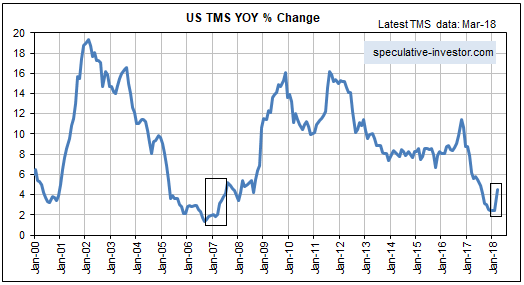[Here is an excerpt from a commentary posted at TSI about a week ago]
In February of this year, the year-over-year rate of growth in the US True Money Supply, a.k.a. the US monetary inflation rate, was only 2.4%. This was its lowest level since March of 2007 and not far from a multi-decade low. In March of this year, however, the monetary inflation rate almost doubled — to around 4.6%. Refer to the following chart for more detail. What caused the reversal and what effect will it have on the economy and the financial markets?

The Fed has been slowly removing money from the economy via its QT program, so March’s money-supply surge wasn’t caused by the central bank. The main cause also wasn’t the commercial banking industry, because although there has been an up-tick in the rate of bank credit expansion over the past month, it is nowhere near enough to explain the increase in TMS.
We can’t be certain, but by a process of elimination, we conclude that the sharp upward reversal in the US monetary inflation rate was due to money coming into the US from overseas. If so, the most likely driver would be the repatriation of corporate profits due to the tax changes approved near the end of last year.
In other words, it’s likely that March’s TMS surge was due more to the way that the banking system accounts for existing US dollars than an increase in the total supply of US dollars.
If the monetary inflation reversal has more to do with a change in the way existing US dollars are accounted for than a sudden large increase in the pace of new dollar creation, then the effects on the economy and the financial markets will be minimal. In any case, after the monetary inflation rate has moved high enough for long enough to set in motion an artificial boom, a drop to a relatively low inflation level will inevitably lead to a bust (an economic recession and a large decline in the stock market, often accompanied by a banking crisis). For example, the pronounced rebound in the TMS growth rate from Q4-2006 to Q3-2007 did not stop the recession, the equity bear market and the banking crisis of 2007-2009.
This means that as a result of the 2017 decline in the monetary inflation rate to near a 20-year low, the die has been cast.
The big unknown right now is the timing of the bust that will occur in response to last year’s precipitous decline in the monetary inflation rate. Will it get underway during the second half of this year or will it wait until next year?
